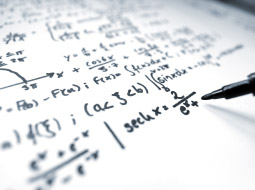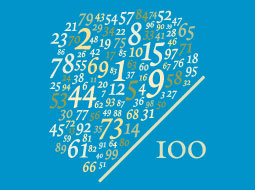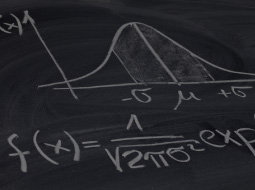Online courses directory (418)
This course is organized around algorithmic issues that arise in machine learning. Modern machine learning systems are often built on top of algorithms that do not have provable guarantees, and it is the subject of debate when and why they work. In this class, we focus on designing algorithms whose performance we can rigorously analyze for fundamental machine learning problems.
This free online training explores complex numbers and equations, polynomial equations, conics, advanced trigonometry, differentiation, antiderivatives, and vectors in 2- and 3-space. This course is both an ideal study-aid for students to improve their skills in their spare time or for anyone interested in exploring the world of mathematics.
Lectures by Prof. S.K.RayrnDepartment of Mathematics and StatisticsrnIIT Kanpur
This course is devoted to the theory of Lie Groups with emphasis on its connections with Differential Geometry. The text for this class is Differential Geometry, Lie Groups and Symmetric Spaces by Sigurdur Helgason (American Mathematical Society, 2001).
Much of the course material is based on Chapter I (first half) and Chapter II of the text. The text however develops basic Riemannian Geometry, Complex Manifolds, as well as a detailed theory of Semisimple Lie Groups and Symmetric Spaces.
In this undergraduate level seminar series, topics vary from year to year. Students present and discuss the subject matter, and are provided with instruction and practice in written and oral communication. Some experience with proofs required. The topic for fall 2008: Computational algebra and algebraic geometry.
Advanced Analytic Methods in Science and Engineering is a comprehensive treatment of the advanced methods of applied mathematics. It was designed to strengthen the mathematical abilities of graduate students and train them to think on their own.
The goal of this course is to describe some of the tools which enter into the proof of Sullivan's conjecture.
Statistics and statistical methods play a major role in the work environment in areas such as business, science, finance, economics, engineering to mention just a few. It is very important that people are comfortable with reading statistics and using statistical methods. This free online Diploma in Statistics will give you the knowledge and understanding of basic statistical methods such as sampling and collecting data, probability, distributions, regression analysis. By completing this course you will gain the knowledge and understanding to confidently read statistics and apply statistical methods within your daily working environment.
This beginners math course is an ideal introduction to fractions. The tutorial uses an interactive multimedia format and relevant examples to thoroughly examine the topic. It is ideal as a study aid or as a complement to face-to-face classes.
This free online course introduces you to the mathematics of probability, chance and the analysis of data. The course begins by introducing data collection and analysis, graphs and frequency distribution. The course examines chance in the context of gambling, odds and probability. The course is of interest to anybody who needs to analyse mathematical data and is particularly valuable to students studying for exams.
This course serves as an introduction to major topics of modern enumerative and algebraic combinatorics with emphasis on partition identities, young tableaux bijections, spanning trees in graphs, and random generation of combinatorial objects. There is some discussion of various applications and connections to other fields.
Statistics 2 at Berkeley is an introductory class taken by about 1000 students each year. Stat2.2x is the second of three five-week courses that make up Stat2x, the online equivalent of Berkeley's Stat 2.
The focus of Stat2.2x is on probability theory: exactly what is a random sample, and how does randomness work? If you buy 10 lottery tickets instead of 1, does your chance of winning go up by a factor of 10? What is the law of averages? How can polls make accurate predictions based on data from small fractions of the population? What should you expect to happen "just by chance"? These are some of the questions we will address in the course.
We will start with exact calculations of chances when the experiments are small enough that exact calculations are feasible and interesting. Then we will step back from all the details and try to identify features of large random samples that will help us approximate probabilities that are hard to compute exactly. We will study sums and averages of large random samples, discuss the factors that affect their accuracy, and use the normal approximation for their probability distributions.
Be warned: by the end of Stat2.2x you will not want to gamble. Ever. (Unless you're really good at counting cards, in which case you could try blackjack, but perhaps after taking all these edX courses you'll find other ways of earning money.)
The fundamental approach of the series was provided in the description of Stat2.1x and appears here again: There will be no mindless memorization of formulas and methods. Throughout the course, the emphasis will be on understanding the reasoning behind the calculations, the assumptions under which they are valid, and the correct interpretation of results.
FAQ
- What is the format of the class?
- Instruction will be consist of brief lectures and exercises to check comprehension. Grades (Pass or Not Pass) will be decided based on a combination of scores on short assignments, quizzes, and a final exam.
- How much does it cost to take the course?
- Nothing! The course is free.
- Will the text of the lectures be available?
- Yes. All of our lectures will have transcripts synced to the videos.
- Do I need to watch the lectures live?
- No. You can watch the lectures at your leisure.
- Will certificates be awarded?
- Yes. Online learners who achieve a passing grade in a course can earn a certificate of achievement. These certificates will indicate you have successfully completed the course, but will not include a specific grade. Certificates will be issued by edX under the name of BerkeleyX, designating the institution from which the course originated.
- Can I contact the Instructor or Teaching Assistants?
- Yes, but not directly. The discussion forums are the appropriate venue for questions about the course. The instructors will monitor the discussion forums and try to respond to the most important questions; in many cases response from other students and peers will be adequate and faster.
- Do I need any other materials to take the course?
- If you have any questions about edX generally, please see the edX FAQ.
This course explored topics such as complex algebra and functions, analyticity, contour integration, Cauchy's theorem, singularities, Taylor and Laurent series, residues, evaluation of integrals, multivalued functions, potential theory in two dimensions, Fourier analysis and Laplace transforms.
This is the first semester of a two-semester sequence on Algebraic Geometry. The goal of the course is to introduce the basic notions and techniques of modern algebraic geometry. It covers fundamental notions and results about algebraic varieties over an algebraically closed field; relations between complex algebraic varieties and complex analytic varieties; and examples with emphasis on algebraic curves and surfaces. This course is an introduction to the language of schemes and properties of morphisms.
This course introduces students to probability and random variables. Topics include distribution functions, binomial, geometric, hypergeometric, and Poisson distributions. The other topics covered are uniform, exponential, normal, gamma and beta distributions; conditional probability; Bayes theorem; joint distributions; Chebyshev inequality; law of large numbers; and central limit theorem.
Lecture Series on Mathematics - III by Prof.P.N.Agarwal, Department of Mathematics, IIT Roorkee.
This course, which is geared toward Freshmen, is an undergraduate seminar on mathematical problem solving. It is intended for students who enjoy solving challenging mathematical problems and who are interested in learning various techniques and background information useful for problem solving. Students in this course are expected to compete in a nationwide mathematics contest for undergraduates.
18.014, Calculus with Theory, covers the same material as 18.01 (Single Variable Calculus), but at a deeper and more rigorous level. It emphasizes careful reasoning and understanding of proofs. The course assumes knowledge of elementary calculus.
This course provides an introduction to algebraic number theory. Topics covered include dedekind domains, unique factorization of prime ideals, number fields, splitting of primes, class group, lattice methods, finiteness of the class number, Dirichlet's units theorem, local fields, ramification, discriminants.
Trusted paper writing service WriteMyPaper.Today will write the papers of any difficulty.






















